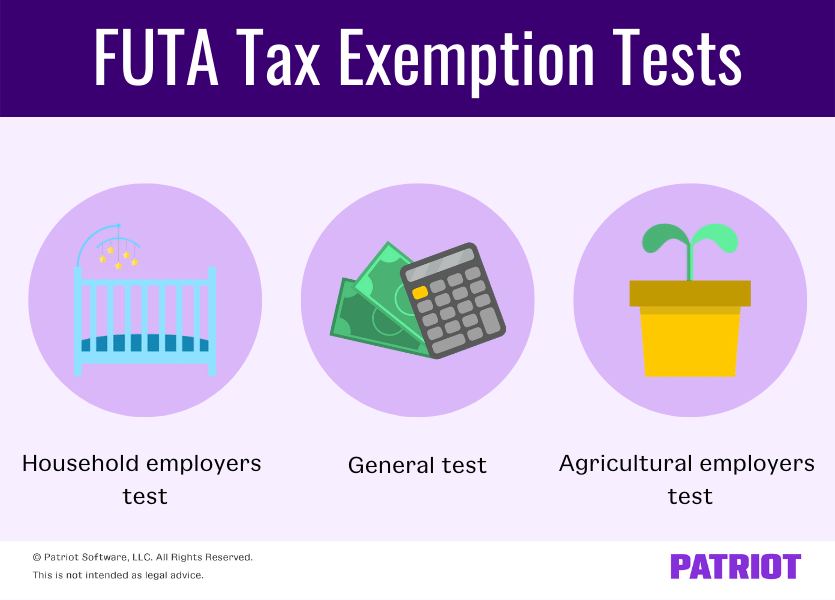As an employer, you’re responsible for many different payroll taxes, including FUTA tax (aka, federal unemployment tax). But in some cases, you may not be responsible for paying FUTA tax. In fact, some businesses are exempt from the tax altogether. Get to know all about FUTA tax exemption and whether or not your business has to pay the tax.
FUTA tax overview
What is FUTA tax? FUTA (Federal Unemployment Tax Act) tax is a federal tax most employers must pay. Unlike some other payroll taxes, FUTA tax is an employer-only tax. The funds from FUTA tax help provide unemployment compensation payments to workers who have lost their jobs.
The FUTA tax rate is 6% and applies to the first $7,000 in wages paid to each employee for the year. The maximum FUTA tax you pay per employee is $420 per year (0.06 X $7,000). However, your FUTA tax rate may be lower than 6% if you qualify for the FUTA tax credit.
Employers responsible for paying FUTA tax must file Form 940, Employer’s Annual Federal Unemployment (FUTA) Tax Return. The form is due annually on January 31.
FUTA tax exemption tests
To find out if you’re required to file and pay FUTA taxes on employee wages, there are three tests you need to know about:
- General test
- Household employers test
- Agricultural employers test
Be sure to follow the correct test to determine if you need to pay FUTA tax and file Form 940.

General test
Most employers use the general test to determine if they’re responsible for paying FUTA tax. According to the general test, you must pay FUTA tax on employee wages if you:
- Paid wages of $1,500 or more to employees in any calendar quarter during the calendar year or the prior year OR
- Had one or more employees (temporary, part-time, or full-time) for at least some part of a day in any 20 or more different weeks during the calendar year
To get more details, review the IRS’s website.
Household employers test
If you employ household employees (e.g., nanny), you must pay FUTA taxes if you:
- Paid more than $1,000 in cash wages to household employees in any calendar quarter during the calendar year or the prior year
For this test, do not count wages paid to a spouse, child under the age of 21, or parent.
Consult the IRS’s website for more information.
Agricultural employers test
If you’re an agricultural employer, you need to follow a different test to determine if you need to pay FUTA tax. You must pay FUTA tax and file Form 940 if you:
- Paid cash wages of $20,000 or more to farmworkers during any calendar quarter in the current or previous calendar year OR
- Employed 10 or more farmworkers during at least some part of a day (whether or not at the same time) during any 20 or more different weeks in the previous calendar year or 20 or more different weeks in the current calendar year
For more information, check out IRS Publication 51.
Who is exempt from FUTA tax?
There are a few scenarios where you may be FUTA exempt. Let’s take a look at them.
Here are some instances where you may have a FUTA exemption:
- You don’t meet one of the general, agricultural, or household employer tests
- You have a 501(c)(3) organization that’s tax-exempt
- You are part of another tax-exempt organization
If your business or organization is exempt from FUTA tax, you don’t have to withhold or pay the tax. And, you are not responsible for filing Form 940 at year-end. If your business meets one of the test thresholds, you must begin paying FUTA tax on applicable employee wages.
If you’re unsure whether or not you’re exempt from FUTA tax, contact the IRS.
Payments exempt from FUTA tax
Along with federal unemployment tax exemptions as a whole, certain types of payments are also exempt from the tax.
So, what payments are exempt from FUTA tax? Here are some examples:
- Fringe benefits
- Group term life insurance
- Employer retirement contributions
- Dependent care
- Group term life insurance
- Other types of payment (e.g., workers’ comp payments)
When running payroll, make sure you know which payments are exempt from FUTA tax. To make things easier on yourself, consider using payroll software. That way, the software can keep track of which payments are exempt from FUTA tax.
Need help calculating FUTA tax? Say no more. Patriot’s online payroll makes it a breeze to calculate, pay, and file federal unemployment taxes. And if you opt for our full-service payroll, we’ll collect, file, and deposit the taxes for you. Try it for free today!
This is not intended as legal advice; for more information, please click here.



